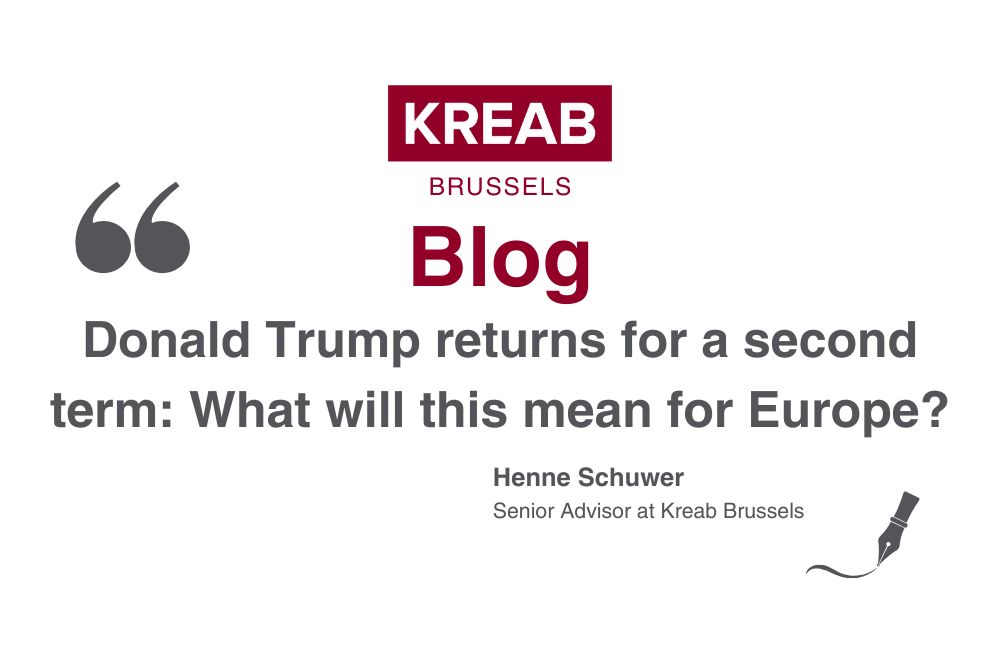
07/11/2024
Donald Trump returns for a second term: What will this mean for Europe?
By Henne Schuwer, Senior Advisor at Kreab (Dutch Ambassador to Washington DC, 2015-2019)
For many, the surprise of Wednesday morning was not the victory of Donald Trump, but the Republicans overwhelming the Democrats to win the Senate and likely the House as well, along with the overall popular vote.
With the Supreme Court also dominated by Republican appointees, trias politica in the US will take on a whole new meaning, at least for the next two years. Trump also will be more free to select loyalists rather than party establishment choices for his staff and cabinet. All this gives him a freer hand to govern without the same opposition as in his first term, and potentially delivery on his campaign theme of “promises made, promises kept”.
What will this mean for Europe?
The most obvious issue is security. Ever since the second World War, Europe has lived under the protection of Pax Americana. To this day, 100,000 American troops are in Europe for our safety.
Trump is no friend of NATO and has said so many times. Pulling out of NATO will be difficult, under the recent, bipartisan Kaine-Rubio legislation that prevents the president from withdrawing unilaterally. However, it is expected that Trump will demand that NATO partners spend more on their defense – perhaps 3% of their GDP. As a transactional president, expect him to state that not doing so would have consequences.
A Trump Administration also might cut or even stop the US support for Ukraine. Trump has said that he can come to an agreement with Putin about the war. This raises the prospect of the US pressuring Ukraine to accept territorial concessions and promises of permanent neutrality, with no membership of NATO and the EU.
How Europe would respond is of great importance. Europe would face a choice on honouring its promises to Ukraine. This would require huge investments in its defence capabilities and could face opposition within the EU from Hungary and Slovakia. The alternative would be seen by many as a moral failure, letting an aggressive dictator have his way with a neighbouring country and so endanger the rest of the continent.
On the economy, the EU will be confronted with a transactional president, who thinks that the world has taken advantage of the US for far too long.
His love for tariffs is well known, and he thinks imposing tariffs on imports from Europe is the best way to rectify the trade imbalance between the US and the EU.
Trump’s first focus will be on China, and he will demand that the EU not become an alternative market for Chinese exports. The “de-risking” policy of Commission President von der Leyen might not be enough for Trump; he could demand that the EU will fall in line with the US policy. If not, the consequence will be sanctions on EU exports. Even if Europe aligns, tariffs may still be levied.
Some people in the Commission are already working on trade war scenarios and, while officials are confident that the EU will win such a trade war, the outcome is far from certain.
The imposition of tariffs raises risks of high inflation, even more so if you take into account the effect it would have if Trump were to carry out his promise to deport more than 10 million illegal aliens.
On regulatory policy, Trump likely will step out of the Paris Agreement on climate change and give a free hand to Houston and the fossil fuel industry. Fracking will increase – his support was likely a factor in his winning the crucial swing state of Pennsylvania – and there will be no more environmental restrictions for the oil and gas industry. That will lower the energy price in the US and give its industries an economic advantage.
More generally, the possible nomination of Elon Musk as deregulation czar could mean a further competitive advantage for US industry compared to European industry that already feels overregulated.
This raises a larger question: the predictability of the US. For a country aiming to be the leader of the Free World, with the richest economy and strongest military power, and with so many people inside and outside the country relying on your policies, you have to be predictable. The rest of the world has come to expect that policies result from democratic and transparent processes.
Trump’s last presidency did not play out this way. He often surprised partners and opponents alike with pronouncements made on social media.
So Europe should expect to face many more surprises. This unpredictability itself presents an extra challenge to which Europe must respond.
_________________________________________________________________________________________
Henne Schuwer, joined Kreab as a Senior Advisor in 2020. During his career, Henne was involved in all Dutch EU Presidencies, the last one as Deputy Permanent Representative of the Netherlands to the EU and Chair of Coreper I. After this, Henne served as the Director of the Private Office of the Secretary General of NATO. Mr Schuwer also has extensive knowledge of US politics and trade issues due to two assignments in the US, including a stint as the Dutch Ambassador to Washington DC in 2015-19.
